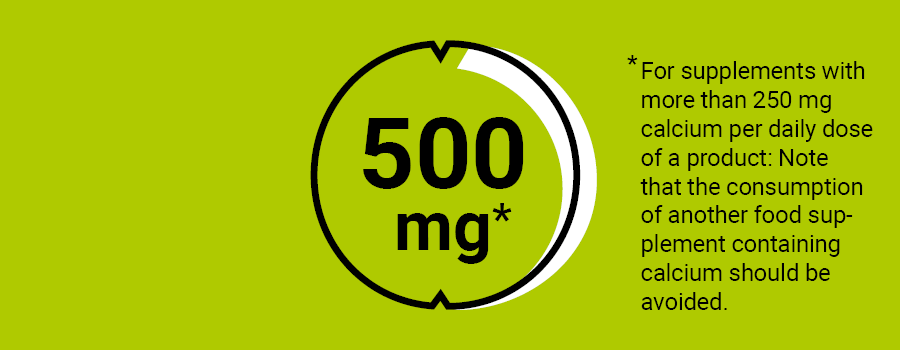You are here:
Calcium
Calcium is the most important mineral in the human body in terms of quantity. Milk and dairy products are particularly good sources of calcium, but some plant foods such as broccoli, kale or almonds are also rich in it. Mineral water with more than 150 milligrams (mg) of calcium per litre is also a good source. Some vegetables, such as rhubarb, chard and spinach, contain oxalic acid in addition to calcium. This forms insoluble complex compounds with calcium, so that the body can hardly absorb the calcium.
Calcium is a component of bones and teeth. It is involved in important cell signal transmissions, supports the transmission of stimuli in the muscles and nervous system and plays an important role in blood clotting. Without calcium, senses such as hearing and seeing would be impaired.
If we consume too little calcium over a long period of time, the body removes the mineral from the bones. In extreme cases, this can lead to growth retardation (rickets) in childhood and demineralisation (osteomalacia) of the bones in adults.
Consumption studies indicate that the population in Germany currently in general consumes sufficient amounts of calcium (exceptions: female adolescents between 14 and 18 years and 65- to 80-year-old women and men).
If too much calcium is ingested for a long time, it can lead to an increased calcium concentration in the blood. Possible consequences: urinary stones and impaired kidney function. In addition, there are indications that taking food supplements with high doses of calcium could increase the risk of heart disease.
However, from the European Food Safety Authority’s (EFSA) point of view, there is no risk of adverse health effects with regular daily intake of up to 2,500 mg of calcium from food, including food supplements for adults.
Proposed maximum level for the addition of calcium to food supplements (per daily dose of an individual product):
 |
To allow consumers a significant additional intake of calcium via food supplements when needed and at the same time protect well-supplied people from excessive intake, the German Federal Institute for Risk Assessment (BfR) recommends not adding more than 500 mg of calcium per daily dose to a food supplement. For daily doses of more than 250 mg calcium in a single preparation, the BfR recommends not taking another calcium-containing food supplement.
Stand: 7/11/2023
Opinion
(1)| Date | Title | Size |
|---|---|---|
|
15.03.2021 BfR Opinion No. 009/2021
|
Updated recommended maximum levels for the addition of vitamins and minerals to food supplements and conventional foods |
478.3 KB
|

